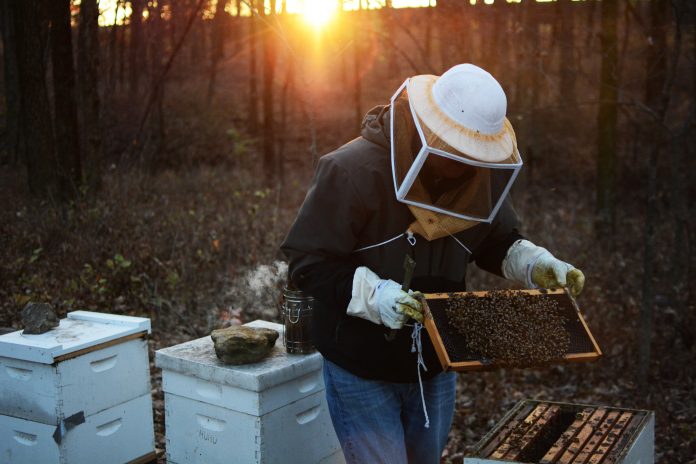
Carina Smith
Features editor
csmit367@jccc.edu
Most students ignore the deciduous woodland off to the right of the entrance on College and North Campus Drive. But tucked away in the woods are nine oddly placed white boxes. Those boxes are home to hundreds of honeybees, who were put there as a part of the college’s beekeeping courses.
The beekeeper who takes care of them year-round and also teaches the classes is Robert Hughes, who has been beekeeping for the past 50 years. His hobby has taken him further than just the beehives. Hughes sells the honey at farmer’s markets, goes to conferences, helps out amatuer beekeepers then takes his honey and equipment to schools as well as the Deanna Rose Farm to teach kids about bees. His main reason for spending his free time on the honeybees? It’s simply fun for him.
“Folks ask, ‘Would you be a beekeeper if bees didn’t sting?’,” Hughes said. “Well that would just take all the fun out of it. If you had a hive and they couldn’t sting you, you would not have that respect you need to give them … It keeps you on your toes, and it just keeps a good balance. So I’m glad bees can sting, because if not there wouldn’t be any fun in beekeeping.”
Hughes was approached years ago and asked to start teaching a class about beekeeping for the Continuing Education department. At the time, he worked for IBM and had been an active member in the beekeeping world. He was than thrilled to get the chance to teach through the college.
The beekeeping courses start as just one class to explain the basics but separates into four classes. The introductory course, Beekeeping I, teaches all about the life of the honeybee and how beekeeping helps them. Students watch videos, learn about honey bees and get helpful advice to become a successful beekeeper.
“The first thing we tell everyone is when you’re doing beekeeping, it’s more of a passion or a hobby,” Hughes said. “And beekeeping has more challenges than folks think it does. It didn’t use to, but with all the diseases and the pests out there, you have to watch the bees a little closer.”
In Beekeeping II students get to go out and see the beehives up close and personal. Students will get decked out in beekeeping gear to see the hives, study the bees and get an idea of what it’s like to be a real beekeeper. Hughes says this is usually the class students enjoy the most.
“We dress in our bee suits and we go out and start digging in the beehives,” Hughes said. “We’ll pull out frames that are covered in bees and students will pass the frames around. We look for the queen, look for the baby bees, look for pollen and drones, the big male bees. And when we’re done, students will say they didn’t get stung, the bees didn’t try and sting them. Well they usually don’t. If you know how to handle bees and how to handle your smoker, they’re pretty gentle.”
Beekeeping III is aimed at teaching students how to properly keep up with their own personal beehive and produce honey. Hughes says the most important thing to take out of this class is that even if your first hive doesn’t make it, you can always try again.
“I always tell folks if you lose your bees your first year, and a lot of folks do, don’t worry about it,” Hughes said. “Try it again next year. Don’t stop beekeeping just because it’s kind of hard.”
Hughes also teaches a youth beekeeping class over the summer and is hoping to create a master beekeeping course through the college. He wants to take the passion for beekeeping that he got as a kid and be able to spread it to others. Hughes also wants to get rid of the negative ideas that a lot of people hold about bees and show them that they are insects we need in our day-to-day lives.
“Bees are so important to pollination,” Hughes said. “Humans can live without honey, but you can’t live without the pollination of all your foods. And that little guy is very efficient.”
Bees are becoming endangered because of things like pesticides, habitat destruction and climate change. Courses like the one taught at the college not only help to get rid of the fear of bees, but also inspire more people to start their own hives and give more bees a place to prosper.
“We’re losing our bees,” Hughes said. “They’re like a canary in a rainforest. And it’s due to a lot of factors and challenges out there for the bees.”
Each beekeeping class only runs for two days in one semester. The classes fill up quickly, so those who are interested can sign up through the JCCC class search. For more information, call the Continuing Education department at (913)-469-4420.To buy some of Hughes’ natural honey or other beekeeping equipment, go to www.beekeepers.com





















